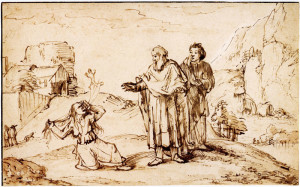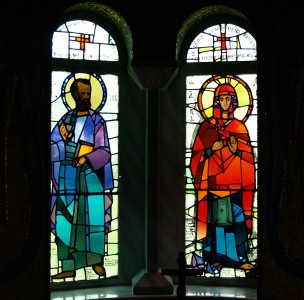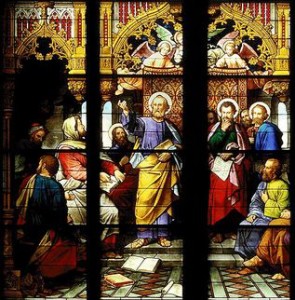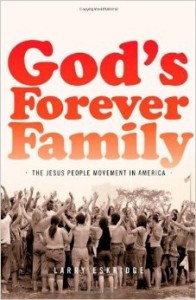16 As we were going to the place of prayer, we were met by a slave girl who had a spirit of divination and brought her owners much gain by fortune-telling. 17 She followed Paul and us, crying out, “These men are servants of the Most High God, who proclaim to you the way of salvation.” 18 And this she kept doing for many days. Paul, having become greatly annoyed, turned and said to the spirit, “I command you in the name of Jesus Christ to come out of her.” And it came out that very hour. 19 But when her owners saw that their hope of gain was gone, they seized Paul and Silas and dragged them into the marketplace before the rulers. 20 And when they had brought them to the magistrates, they said, “These men are Jews, and they are disturbing our city. 21 They advocate customs that are not lawful for us as Romans to accept or practice.” 22 The crowd joined in attacking them, and the magistrates tore the garments off them and gave orders to beat them with rods. 23 And when they had inflicted many blows upon them, they threw them into prison, ordering the jailer to keep them safely. 24 Having received this order, he put them into the inner prison and fastened their feet in the stocks.
It was C.S. Lewis who said that there are two equal but opposite errors Christians can commit when thinking about the devil. The first is to think too little of the devil: to remain blissfully ignorant of his schemes and tactics, to fail to realize that he is crafty and scheming, to fail to consider carefully all that scripture says about our adversary. This error leaves us an easy target and unprepared to withstand the devil’s schemes. The other error is to think too much of the devil: to fixate on him, to ascribe to him too much power, to fail to realize the victory that Christ has won and is winning for us, to see him literally everywhere and in everything. This error can make us obsessive and can paralyze us with fear. Most tragically, it downplays the power and authority and victory of Christ.
Our text will help us avoid both areas. It shows us how very dangerous and crafty the devil truly is. However, it also dramatically demonstrates the ultimate authority of Christ over the devil and his minions.
The devil is crafty and may attack the Church through confusing, disruptive followership. (v.16-18a)
Let us first consider the craftiness of the devil. Paul and his team are in Philippi. They begin to be followed by a slave girl whose behavior becomes increasingly disruptive.
16 As we were going to the place of prayer, we were met by a slave girl who had a spirit of divination and brought her owners much gain by fortune-telling. 17 She followed Paul and us, crying out, “These men are servants of the Most High God, who proclaim to you the way of salvation.” 18 And this she kept doing for many days.
Who was this girl? Clinton Arnold has offered some fascinating background information about who she likely was as well as a very interesting insight into Luke’s description of her.
This young girl receives her inspiration from what Luke literally calls a “python spirit” (pneuma python). The Python dragon or serpent was associated with the oracle sanctuary at Delphi, about eighty miles northwest of Athens. In the story of the origin of the cult, Apollo killed this large snake that was guarding the entrance to the oracle cave. Apollo then became the guardian and patron of this sanctuary, which was an entrance to the underworld. During the Greco-Roman era, people came from all over the Mediterranean world to consult the priestesses of Apollo (called pythia) for advice. The Pythia descended into the oracle grotto to seek inspiration from the god by allowing herself to be possessed by a spirit. She then arose and uttered the god’s instructions to the inquirer – first in an ecstatic, gibberish speech and then typically in the form of Greek verse. The first-century writer Plutarch, himself a priest of the Delphic god, refers to the priestesses as engastrimythoi (“belly talkers”) because of the sound of their voices as the god or spirit spoke through them.[1]
This girl, then, would be connected in the minds of the people with the python spirit, a spirit that was not considered to be malevolent by the Greeks. However, Christians do not accept that there are such harmless spirits that we can or should consult. We believe that the Holy Spirit is the Spirit that has been given to lead us into all truth, and not a spirit of divination.
What is confusing here, though, is what the girl says. “These men are servants of the Most High God, who proclaim to you the way of salvation.” Why is this confusing? It is confusing because the demon within her is actually speaking the truth. They were indeed “servants of the Most High God” and they did indeed “proclaim…the way of salvation.”
What is happening here? For starters, there is the divine title that the demon uses: “the Most High God.” It could be that this is something of an offensive maneuver against the apostles. That is, it could be that the demon was using the name of God in an almost mocking way or a way that demonstrated presumption on the devil’s part, though this would not have been apparent to those who heard her using the divine title. The name of God is holy and sacred and is not to be used in vain or arrogantly or with any intention other than genuine worship. Whatever is happening here, we can be sure that the devil is not using God’s name with worshipful intent.
You may note certain similarities between this scene and Jesus’ encounter with the Garasene demoniac in Luke 8. Listen closely:
26 Then they sailed to the country of the Gerasenes, which is opposite Galilee. 27 When Jesus had stepped out on land, there met him a man from the city who had demons. For a long time he had worn no clothes, and he had not lived in a house but among the tombs. 28 When he saw Jesus, he cried out and fell down before him and said with a loud voice, “What have you to do with me, Jesus, Son of the Most High God? I beg you, do not torment me.” 29 For he had commanded the unclean spirit to come out of the man. (For many a time it had seized him. He was kept under guard and bound with chains and shackles, but he would break the bonds and be driven by the demon into the desert.) 30 Jesus then asked him, “What is your name?” And he said, “Legion,” for many demons had entered him. 31 And they begged him not to command them to depart into the abyss. 32 Now a large herd of pigs was feeding there on the hillside, and they begged him to let them enter these. So he gave them permission. 33 Then the demons came out of the man and entered the pigs, and the herd rushed down the steep bank into the lake and drowned.
You will notice that here too the devil uses the title “the Most High God.” Why, then, does Paul cast the demon out? Why silence a demon that is, in fact, speaking truth? The 15th century German Reformed Hebraist Konrad Pellikan argued that behind the actual words of the demon were nefarious motivations aiming ultimately at deceiving those who listened.
[I]t is the deceitful genius of Satan, that he is the father of lies, not only because he always speaks through manifest lies but because he also misuses the manifest truth to convince people of lies for the purpose of deceiving them, so that in the end, by the appearance of truth, he convinces people of falsehood. Satan’s cleverness and trickery are of no use to him against Christ, for Christ also cast out demons of this sort and forbade them to speak. In fact, here Paul orders the demon to be silent in the name of Christ, and it departs from the girl. It was an unmistakable sign indicating that, even if Satan speaks the truth from time to time, nevertheless he does so to deceive. Therefore we must close our ears to Satan’s voice whether he speaks factually or not, lest we are seduced to the lies of Satan by some version of the truth.[2]
Origen said that in casting the demon out, Paul was imitating Christ who “does not accept witness from demons” and that Paul “considered testimony given by the spirit of Python unworthy of his message.” Chrysostom argued that Paul cast the demon out because he “did not want to make him believable” and went on to say that “if Paul had admitted his testimony, the demon would have deceived many of the believers.” He further said that the demon was using “agreement for the purpose of destruction.”[3]
There is wisdom here, but the very fact that we are having to try to figure out exactly what is happening here is evidence of the devil’s craftiness. The devil is crafty and may attack the Church through confusing, disruptive followership. He appears here to be a member of the Church, advancing and proclaiming the name of Christ. However, Paul saw it for what it was: a subtle attempt by Satan to deceive by masquerading as a worshipper of God.
Be careful! Not all who use the language of the faith have the heart of the faith. Such was the case with this demon possessed slave girl.
The devil is also adaptable and may, when confusing attempts fail, attack the Church through inciting anger fueled by ignorance. (v.19-24)
But what happens when the devil’s craftier attempts fail? Consider what he does to Paul and Silas.
19 But when her owners saw that their hope of gain was gone, they seized Paul and Silas and dragged them into the marketplace before the rulers. 20 And when they had brought them to the magistrates, they said, “These men are Jews, and they are disturbing our city. 21 They advocate customs that are not lawful for us as Romans to accept or practice.” 22 The crowd joined in attacking them, and the magistrates tore the garments off them and gave orders to beat them with rods. 23 And when they had inflicted many blows upon them, they threw them into prison, ordering the jailer to keep them safely. 24 Having received this order, he put them into the inner prison and fastened their feet in the stocks.
Failing to deceive through his more subtle efforts, the devil next turns to a frontal attack. When Paul cast the demon out, he lost the girl’s owners a great deal of money. People would pay her owners to hear what the python spirit would say through her. Paul ended that. You will also see another parallel here between this story and that of the Gerasene demoniac: the casting out of the demons in both stories cost somebody money and this leads to great displeasure.
So the devil now works through the anger of the people as they appeal to the authorities for help. He appears to do so through what were likely some anti-semitic sentiments in Philippi, or at least xenophobic (fear of foreigners) sentiments. Remember that there were not enough Jews in this area even to have a synagogue, so he is playing on the fears of the people concerning this largely unknown group: “These men are Jews.”
Furthermore, they allege that Paul and Silas are fostering civil unrest and even illegal activities. In doing so, you can see shades of the tactics of the Jews before Pilate when they were seeking Roman involvement in their efforts to rid themselves of Jesus. They played the politics card: “These guys are upsetting the people and causing trouble and encouraging illegal behavior in our town!” This, of course, got the attention of the authorities and leads to direct persecution: beatings and imprisonment and the stocks.
For our purposes, let us notice the progression in Satan’s tactics: (1) subtle attempts to deceive and (2) blatant efforts to persecute. The devil does not move to his more nakedly aggressive efforts until his more subtle efforts are sniffed out. When it is clear that the little demon possessed girl cannot derail the missionary team, then and only then does he turn to outright persecution.
There is a disturbing lesson in this for us: what might it say about us that the devil so rarely has to resort to outright persecution against us? What might it say that he never has to move toward his “Plan B” of oppression? Might it not mean that he has no need to do so since we are so rarely able to get past his “Plan A”?
In other words, he rarely has to persecute us outright because he is so effective at tripping us up with his subtle, crafty efforts.
Would that we followed the Lord Jesus closely enough and carefully enough that the devil had to make more blatant efforts to eradicate us. As it stands, he does not need to eradicate us because he has so effectively distracted us.
Live in such a way that the devil has to go to “Plan B” against you! Do not give him the satisfaction of being able to sideline you with little girls being annoying! Make him bring out the big guns!
But the devil is always a creature and can never withstand the authority of the Creator. (v.18b-c)
These satanic efforts must regrettably be understood. They must be appreciated so that the devil can be effectively guarded against. But in all of this talk about the devil and his wiles, we would be blasphemously mistaken if we did not end with this crucial point: the devil is always a creature and can never withstand the authority of the Creator. He is crafty, but he is not God. This is evident when we go back to the actual moment of exorcism in verse 18.
18b-c Paul, having become greatly annoyed, turned and said to the spirit, “I command you in the name of Jesus Christ to come out of her.” And it came out that very hour.
Clinton Arnold points out that it would have been considered “unusual” for somebody to cast out a Python spirit “which was thought to be a good and helpful spirit, not a malevolent one.”[4] But out this spirit must come! Why? Because we know that if a spirit is not from God it is from the devil himself.
Paul turns to the girl, rebukes the spirit, and, Luke tells us, “it came out that very hour.”
There is something theologically profound in the lack of elaboration in this. Paul commands an exit “in the name of Jesus Christ” and the devil must flee! How beautiful! How powerful! How very important for us to remember!
The devil may attack, but he is a defeated attacker. He may discourage, but he is a defeated discourager. He may persecute, but he is a defeated persecutor.
What we are experiencing on this side of heaven is simply the last, desperate thrashings of an enemy who knows his days are number. He has been defeated, but he has simply not yet been destroyed. We live between his defeat and his destruction and, as a result, we are the objects of his dark rage. But the light shines in the darkness and the light is Christ!
Church: the devil is no match for the Lord Jesus! He cannot withstand the Lamb Who was slain and risen, Who has ascended but Who is coming again!
He cannot withstand the strong name of Jesus.
He quakes in fear before the Lamb who conquers.
He shudders in dread.
As Luther reminds us in his beautiful hymn, “A Mighty Fortress is Our God”:
And though this world, with devils filled,
Should threaten to undo us,
We will not fear, for God hath willed
His truth to triumph through us:
The Prince of Darkness grim,
We tremble not for him;
His rage we can endure,
For lo! his doom is sure,
One little word shall fell him.
Amen, and amen.
[1] Clinton E. Arnold, “Acts.” Zondervan Illustrated Bible Backgrounds Commentary. Vol.2. Clinton E. Arnold, gen. ed. (Grand Rapids, MI: Zondervan, 2002), p.374.
[2] Esther Chung-Kim and Todd R. Hains, eds. Acts. Reformation Commentary on Scripture. New Testament, vol.VI. Timothy George, gen. ed. (Downers Grove, IL: InterVarsity Press, 2014), p.232.
[3] Francis Martin, ed. Acts. Ancient Christian Commentary on Scripture. New Testament, vol.V. Thomas C. Oden, gen. ed. (Downers Grove, IL: InterVarsity Press, 2006), p.202-203.
[4] Clinton E. Arnold, p.375.









